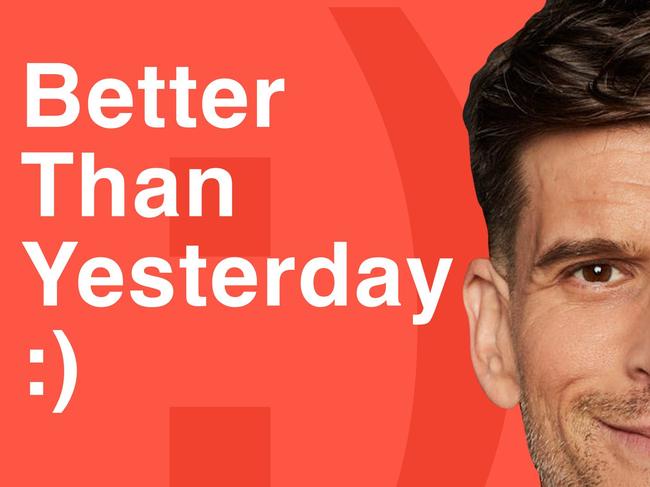Osher Gunsberg on how we can look after ourselves during lockdown
Osher Gunsberg’s podcast has been a lifeline as we isolate from friends and family. Now the popular presenter shares some heartfelt tips on how we can care for our mental health during lockdown.
Hibernation
Don't miss out on the headlines from Hibernation. Followed categories will be added to My News.
The most common feedback Osher Günsberg gets from people these days? Thank you.
The heartfelt compliments are for his podcast Better Than Yesterday, his passion project for seven years, which now has 300,000 monthly listeners around the globe (thanks to the forensic analytics, he even knows that there’s only two people who listen on a desktop rather than a phone – they work in a lab and can’t use phones).
It runs twice weekly – one episode an in-depth interview with everyone from CEOs to journalists to comedians, one a check-in which is lately Gunsberg sharing mental health tips.
It’s first-hand information – Gunsberg celebrated a decade of sobriety in March and in February titled one episode Six Years After My Brain Broke.
“They know me as the blond muppet from Australian Idol or the guy that whispers on The Bachelor,” Gunsberg tells HiberNation from isolation in Sydney with his family, including newborn son Wolfie.

“Suddenly they’ll hear me talking all about sobriety. The amount of emails I get from people who say ‘Your story is my story’. I’m not special. I’m a bog-standard alcoholic who’s terrified of what climate change is doing to our planet. But if I’m speaking out loud about those things I might not make people feel so alone. That’s the best we can do. We have to help each other move past the anxiety and the fear. I wish I could have heard these conversations when I was at my worst. That’s where I come from every week.”
Gunsberg is recording his podcasts at home while his TV work hosting The Bachelor and The Masked Singer has been put on pause due to coronavirus. He’s plotting a third podcast episode a week, figuring he has spare time and a captive audience.
“Taking control of your mental health is a powerful move,” he continues. “Smoking bongs or hitting the beers, you might think it makes it better, but it hits pause on the immediate effects you’re feeling while the causes of what you’re feeling get worse. The next day you wake up and it’ll actually be worse. It’s a horrid cycle that keeps going. You have no idea how incredible your life can become when you break out of that.”
After a summer where episodes centred around climate change and bushfires, Günsberg is now helping listeners deal with the mental health challenges thrown up by COVID-19 and the resulting isolation.
“There is so much that we can’t control,” he notes. “I can’t control economic policy or how quickly our country clamped down on social distancing or why you’re still allowed to have a haircut. I can control how I feel about them though. For some people, it might be the first time this concept has been brought to them – if your brain is healthy you can choose how you feel about things. There are techniques we can explain. This is an opportunity for us to get a baseline on our own resilience – fistfights in the grocery store over toilet paper for me is a symptom of a society that isn’t very resilient.
“COVID-19 is going to look like someone knocked over your wheelie bin when we see what climate change is bringing us in the next 10 years. So now is the time for us to go OK, let’s get used to thinking of we not me, get used to being more resilient and controlling the things we can and accepting the things we cannot change. This is an opportunity to work on that space, as a community understand we need to work on our mental six-pack.”

Gunsberg has some great mental health tips for isolation.
LIMIT SOCIAL MEDIA
“The business model of sites like Facebook, Google, Twitter and Instagram is to keep you on those platforms for as long as possible so you click on ads and make them money. What makes you click? Things that make you scared. Remember that. They’re tickling your fear buttons. The algorithm of the variable reward system on Instagram is built like a poker machine – something you’re interested in, boring picture, boring picture, something you like, boring picture, something scary. Twitter, Instagram and Facebook are blocked on my phone for my own mental health. Having a little poker machine in my pocket that shows me there’s a notification on Instagram is not a very healthy way to get your serotonin.”

IT’S OUT OF YOUR CONTROL
“Take control of the things you can, accept the things you cannot change. It’s straight from sobriety. I can’t control the government’s policies on anything. I can’t control the economy or that I can’t work right now. I can control how much sleep I get, what I eat, how much exercise I get, how I am to other people, how useful I am around to the house. I can control what makes me happy, which is being of service to others.”
ACCEPTANCE
“Susan David is an extraordinary psychologist who was on my podcast who has this amazing line ‘Uncomfortable feelings are the price of admission to a meaningful life’. It is really uncomfortable right now. That’s OK. That’s part of life. Pain, discomfort, disappointment, sadness, grief, loss … these are all the prices that we pay so we can feel joy, happiness, abundance, wanting to dance in the street, love, kindness. When we accept the difficult feelings, they become less powerful. Understand you’re not alone.
It’s an extraordinary time in history where everyone in the world is faced with the same problem. Take control of it. Don’t let it beat you.”

TALK TO PEOPLE
“I try to speak to someone I know on the phone – not texting – for at least 15 minutes a day. Have a conversation. How are things, what’s going on? If the baby is eating, we will Facetime someone. Who doesn’t want to watch a baby smash avocado all over their face? It’s wonderful to wake up to.
Checking in with other human beings is vitally important. You have agency in this. Pick up the phone. Go for a walk. Ask your neighbour ‘Hi we don’t know each other, but do you need anything?’ That will make you feel so good. It’s really simple stuff. It’s not going to Costco and buying a
20-pack of underwear for $5. It’s getting to know Keith from across the street. It’s community. We not me. Getting back in touch with our humanity and our community will get us through this.”
